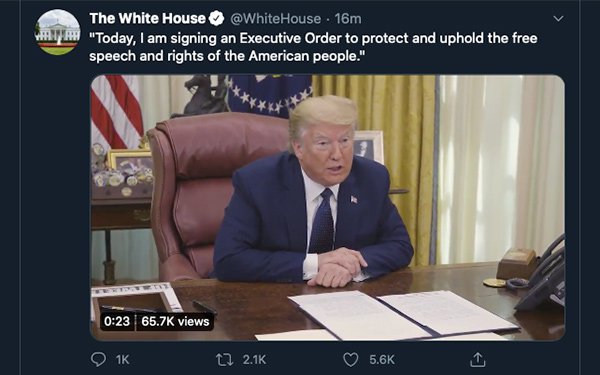
Ahead of an expected executive
order from President Trump that would regulate speech on social platforms, officials are weighing the merits of such an action.
“This does not work,” Jessica Rosenworcel, one of
the Federal Trade Commission’s five commissioners, asserted in a statement.
“Social media can be frustrating,” the Democratic commissioner added. “But an executive
order that would turn the Federal Communications Commission into the President’s speech police is not the answer.”
According to a draft of the order obtained by Digital News
Daily, it will call for the FCC to propose rules about when and how social media companies may edit content online without forfeiting their protections under Section 230 of the Communications
Decency Act.
advertisement
advertisement
Section 230 protects social-media companies from legal liability for the material their users post.
“When large, powerful social-media companies censor opinions with
which they disagree, they exercise a dangerous power,” the draft order declares.
Standing apart from his colleague, Brendan Carr, a Republican FCC Commissioner, has come out in favor of
the would-be order.
Along with a column in The Wall Street Journal, Carr fired off several tweets attacking Twitter’s decision to begin
labeling some false statements tweeted by the President as “potentially misleading,” this week.
In one tweet, Carr described Twitter’s policy change as a “tactic” to “control the political narrative.”
The decision by Twitter was made in the
context of a growing backlash
over its unwillingness to police Trump’s more outlandish tweets.
Although initially silent on the matter, Twitter cofounder-CEO Jack Dorsey defended the policy change on Wednesday
night.
“Our intention is to connect the dots of conflicting statements and show the information in dispute so people can judge for themselves,” Dorsey tweeted. “More transparency from us is critical, so folks can clearly see the why behind our actions.”
Putting
added pressure on Dorsey, Mark Zuckerberg said this week that social networks should not be policing politicians.
“I don’t think that Facebook or Internet platforms in general should be arbiters
of truth,” Facebook’s cofounder-CEO said on CNBC’s “Squawk Box” on Thursday morning.
“Political speech is one of the most sensitive parts in a democracy, and people should be
able to see what politicians say,” he added.
Trump initially responded to Twitter’s policy change by threatening to “strongly regulate” the social-media business.
“Republicans feel that Social Media Platforms totally silence conservatives voices,” Trump tweeted on Wednesday. “We will strongly regulate, or close them down,
before we can ever allow this to happen.”
On Thursday,
The Washington Post then
reported the White House was readying the executive order.